Navigating the MVR Check Process for Employers
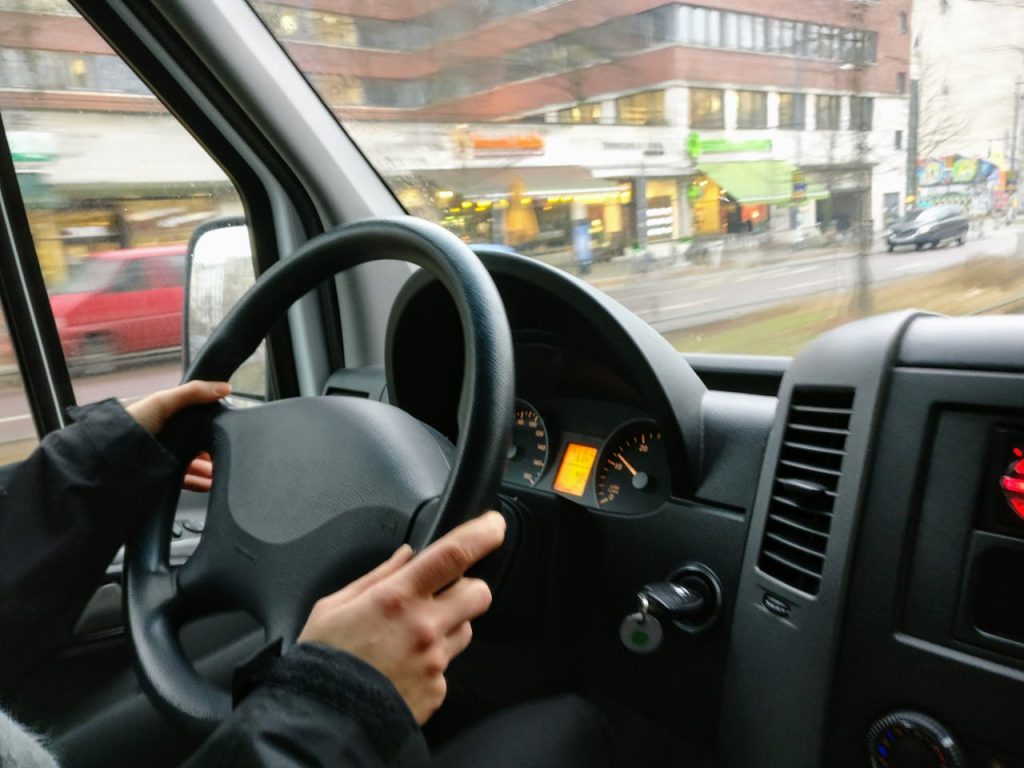
Overview and Importance of MVR Checks for Employers
In industries where driving is an essential part of the job, ensuring employee safety and responsibility is critical. From logistics companies and delivery services to sales teams and contractors, hiring individuals with a clean and reliable driving record can mean the difference between operational success and costly liabilities. This is where MVR (Motor Vehicle Record) checks for employers become indispensable.
An MVR check provides employers with a detailed history of an individual’s driving behavior, revealing critical insights like traffic violations, license status, and any DUI/DWI offenses. Beyond meeting legal and safety standards, MVR checks play a crucial role in safeguarding the reputation and financial stability of a business.
What is an MVR Check?
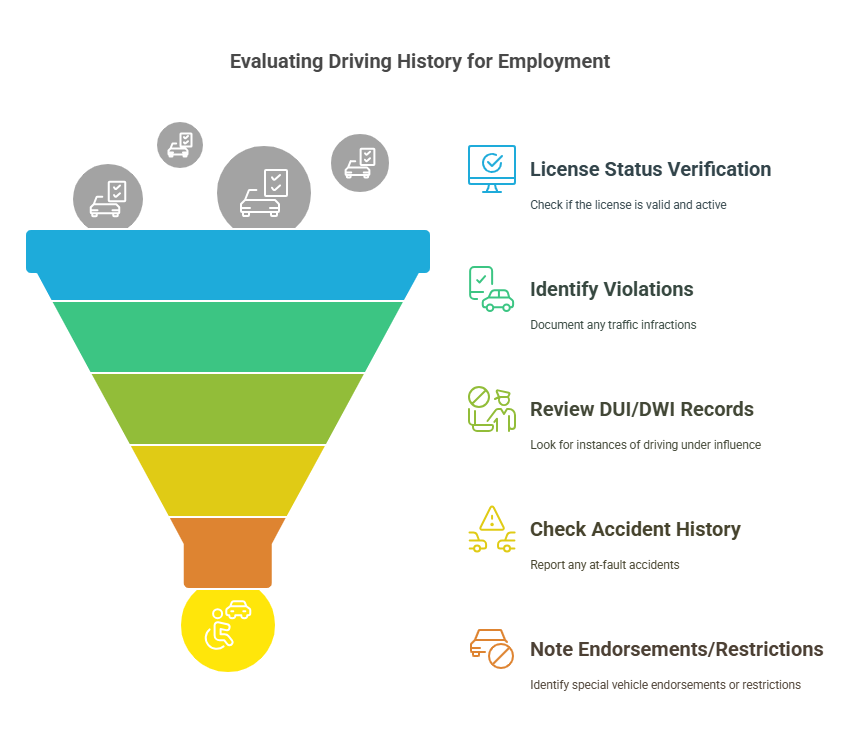
An MVR check involves obtaining a report from a state’s Department of Motor Vehicles (DMV) or similar agency to assess an individual’s driving history. Employers use these reports to verify whether potential hires or current employees are qualified and safe to operate company vehicles.
Key details included in an MVR check are:
- License Status: Indicates whether the individual holds a valid, active license.
- Suspensions and Revocations: Highlights any restrictions or penalties on driving privileges.
- Traffic Violations: Documents speeding tickets, reckless driving incidents, and other infractions.
- DUI/DWI Records: Identifies instances of driving under the influence of alcohol or drugs.
- Accident History: Reports any at-fault accidents or claims tied to the individual.
- Special Endorsements or Restrictions: Notes whether the driver is licensed to operate specific types of vehicles (e.g., commercial trucks) or has limitations (e.g., corrective lenses required).
MVR checks go beyond simple background screening. They provide actionable insights that can protect a company from risk and liability, especially in roles where safe driving is essential.
Why Are MVR Checks Critical for Employers?
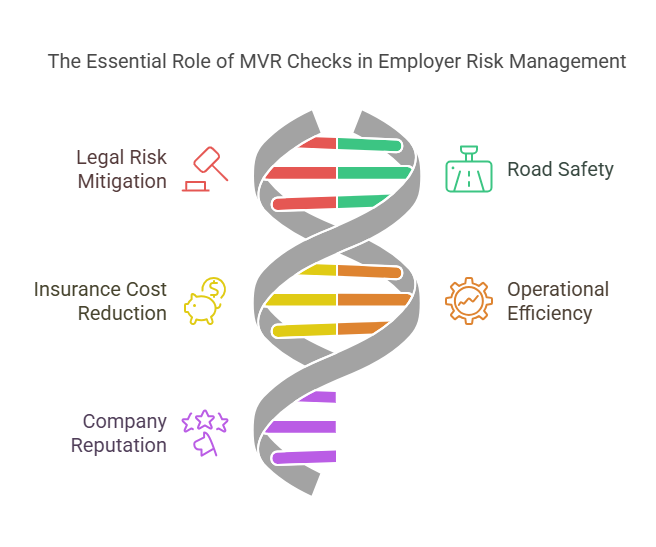
1. Mitigating Legal Risks
Employers are held accountable for the actions of their employees while they are on the job. If an unqualified driver causes an accident, the company may face legal action for negligent hiring. MVR checks demonstrate due diligence in vetting drivers, reducing liability exposure and ensuring compliance with employment regulations.
2. Ensuring Safety on the Road
Drivers with a history of reckless behavior, DUI offenses, or repeated violations pose a direct risk to public safety, company assets, and the well-being of others on the road. By screening potential hires with MVR checks, employers can identify and avoid high-risk individuals, ensuring safer conditions for everyone involved.
3. Reducing Insurance Costs
Insurance companies closely evaluate the driving history of employees operating company vehicles. Hiring individuals with clean driving records can result in significant savings on premiums. Conversely, employees with poor driving histories may cause insurance rates to spike or even result in denied coverage. Conducting MVR checks helps businesses avoid these financial burdens.
4. Enhancing Operational Efficiency
A valid driver’s license and a clean record are critical for ensuring uninterrupted operations. If a company unknowingly hires someone with a suspended or revoked license, it could face significant delays, reduced productivity, or legal penalties. MVR checks allow businesses to verify qualifications upfront, ensuring seamless operations.
5. Safeguarding the Company’s Reputation
The drivers you hire represent your company on the road. Incidents involving reckless driving, accidents, or DUIs can harm your brand’s reputation and erode customer trust. MVR checks help businesses hire reliable individuals who uphold the company’s image.
The Risks of Skipping MVR Checks
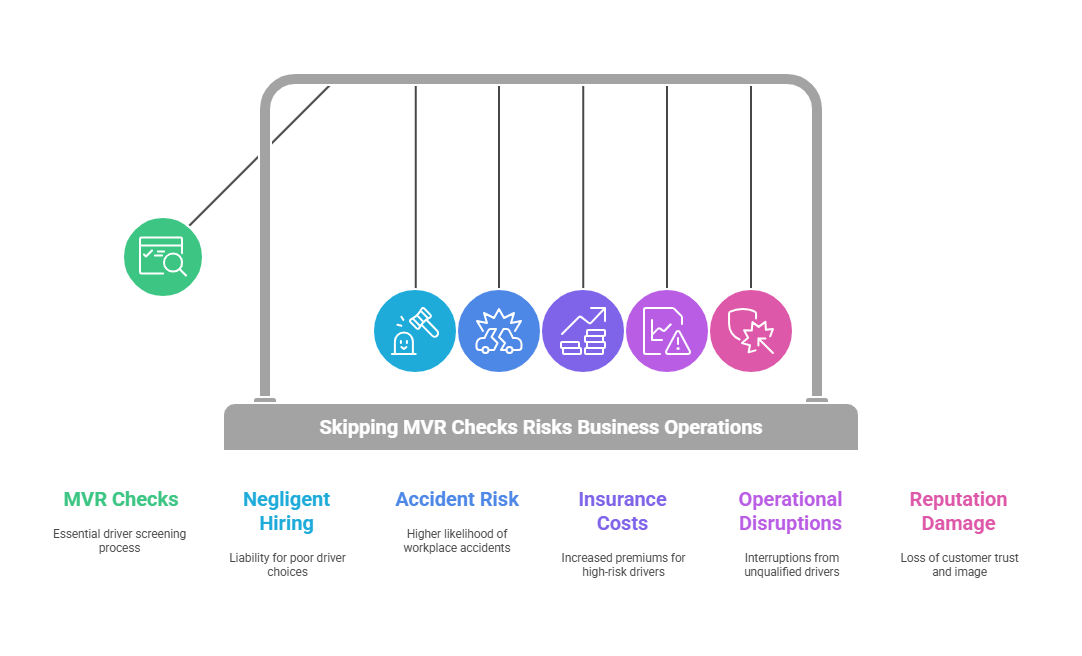
Failing to conduct MVR checks can lead to serious consequences, including:
- Negligent Hiring Liability: If a driver with a poor record causes an accident, your business could be held responsible for failing to screen their history adequately.
- Increased Risk of Accidents: Employees with a history of reckless driving or substance abuse are more likely to cause workplace accidents, endangering others and damaging company assets.
- Higher Insurance Costs: Without MVR checks, you risk hiring high-risk drivers, which can lead to increased insurance premiums or loss of coverage altogether.
- Operational Disruptions: Employing someone with an invalid or suspended license can result in unexpected interruptions, fines, and delays in critical operations.
- Reputation Damage: Incidents involving unqualified drivers can tarnish your company’s image, especially in industries where customer trust is vital.
Industries Where MVR Checks Are Essential
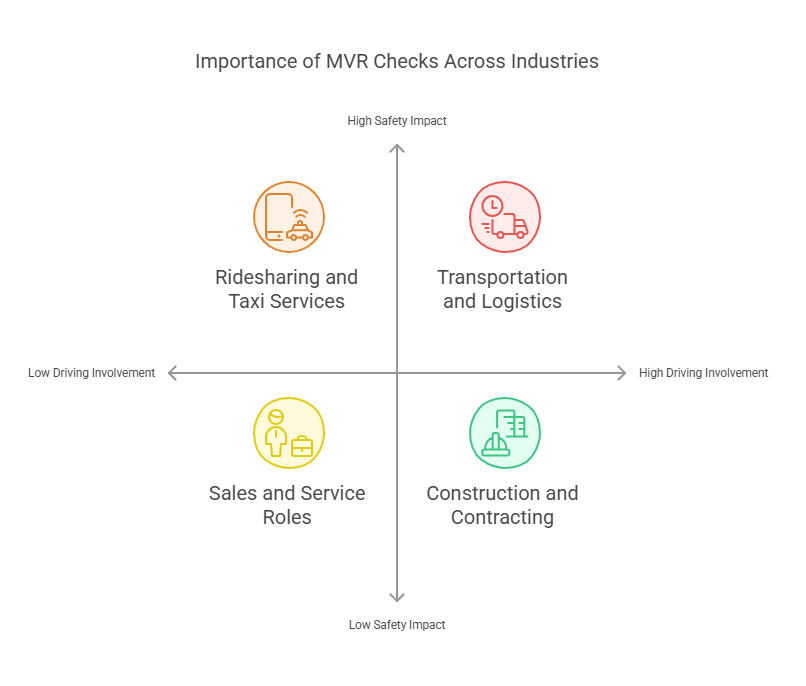
While MVR checks benefit any employer hiring for roles that involve driving, they are particularly crucial in the following industries:
- Transportation and Logistics: Trucking companies and delivery services rely on drivers to ensure timely, safe deliveries. MVR checks prevent accidents and delays.
- Ridesharing and Taxi Services: Companies like Uber and Lyft must prioritize passenger safety, making clean driving records a non-negotiable requirement.
- Construction and Contracting: Heavy equipment operators and contractors often use vehicles to transport materials and equipment. MVR checks minimize risks on worksites and public roads.
- Sales and Service Roles: Employees who use company vehicles for client visits or service calls represent your brand on the road. Safe, reliable drivers maintain professionalism and trust.
Statistics Supporting the Importance of MVR Checks
- Driver-related factors contribute to 94% of traffic crashes, according to the National Highway Traffic Safety Administration (NHTSA).
- Businesses that regularly conduct MVR checks report up to a 40% reduction in preventable accidents.
- Hiring drivers with clean records can lower commercial auto insurance premiums by up to 20%, according to industry reports.
- A study by SambaSafety revealed that 20% of drivers on the road have violations serious enough to disqualify them from driving professionally.
These figures underscore why employers should never overlook the value of conducting thorough MVR checks.
How MVR Checks Improve Long-Term Business Success
Employers who integrate MVR checks into their hiring and ongoing evaluation processes can reap significant long-term benefits:
- Proactive Risk Management: By identifying and addressing potential risks before they lead to costly incidents, businesses can save time, money, and resources.
- Employee Accountability: Employees aware of regular MVR checks are more likely to adopt responsible driving habits.
- Regulatory Compliance: Many industries have strict regulations requiring regular driving record monitoring. MVR checks ensure your business remains compliant.
- Peace of Mind: Knowing your drivers are qualified and trustworthy allows you to focus on growing your business rather than worrying about avoidable risks.
Process and Tools for Conducting MVR Checks
Introduction
Motor Vehicle Record (MVR) checks are a vital part of the hiring and risk management process for employers in industries that require employees to drive. However, conducting these checks effectively and ensuring compliance with legal regulations can seem daunting. Employers must not only understand the process but also choose the right tools and services to streamline the screening while maintaining accuracy and efficiency.
This section explores the step-by-step process of conducting MVR checks, the key details employers should focus on, and the tools available to simplify and enhance the process.
Step-by-Step Process for Conducting MVR Checks
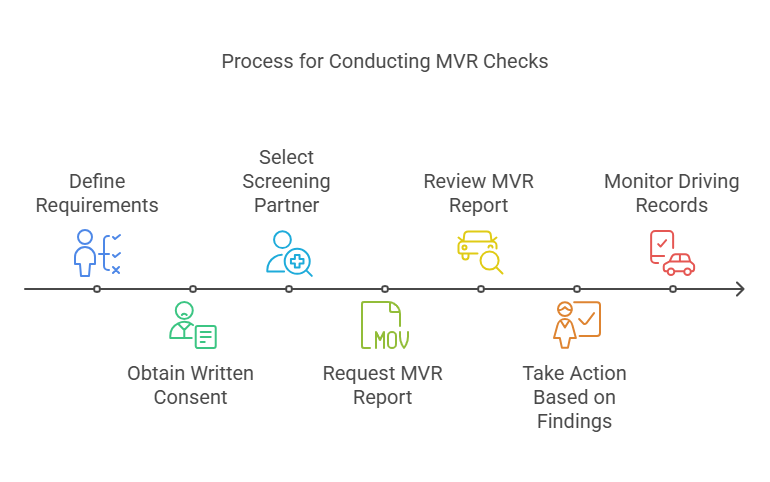
Step 1: Define Your Requirements
Before conducting an MVR check, it’s important to determine the scope and purpose of the screening.
- Identify roles that require MVR checks. For example, positions involving company vehicle operation or commercial driving licenses (CDLs).
- Set specific criteria for eligibility. Decide what violations or patterns of behavior (e.g., DUIs, repeated speeding tickets) would disqualify a candidate.
Clearly defining your requirements ensures consistency in screening and reduces the chances of subjective decision-making.
Step 2: Obtain Written Consent
Employers must obtain written consent from candidates or employees before accessing their driving records. This is a legal requirement under the Fair Credit Reporting Act (FCRA).
- Prepare consent forms explaining the purpose of the MVR check and the information that will be obtained.
- Ensure compliance by informing the individual of their rights, including the right to dispute inaccurate findings.
Step 3: Select a Reliable Screening Partner
While some businesses may attempt to access driving records directly from state DMVs, partnering with a third-party service specializing in MVR checks is often more efficient.
- Choose a provider with expertise in background checks and compliance, like Exact Background Checks, which offers comprehensive MVR screening solutions.
- Verify their capabilities, such as nationwide coverage, real-time results, and robust data security protocols.
Step 4: Request the MVR Report
After securing consent and partnering with a reliable provider, you can request the MVR report. The request typically involves:
- Providing the individual’s full name, date of birth, and driver’s license number.
- Specifying the type of report needed (e.g., standard driving history, CDL report).
- Ensuring state-specific requirements are met, as each state’s DMV has different protocols.
Step 5: Review the MVR Report
Once you receive the report, review it carefully to assess the individual’s driving history. Key details to focus on include:
- License Status: Ensure the license is valid and active. Suspensions or revocations should be flagged immediately.
- Traffic Violations: Note any patterns of unsafe behavior, such as excessive speeding or reckless driving.
- DUI/DWI Records: Prioritize screening for alcohol- or drug-related offenses, as they pose significant risks.
- Accident History: Assess whether the individual has a history of at-fault accidents.
- Endorsements and Restrictions: Confirm whether the individual holds necessary endorsements for specific vehicles (e.g., CDL) or has restrictions.
Employers should compare the findings to the predefined criteria established in Step 1.
Step 6: Take Action Based on Findings
Based on the results of the MVR check:
- Approve the candidate if their driving history aligns with your criteria.
- Discuss findings with the candidate if minor issues are present, offering a chance for explanation or dispute.
- Disqualify the individual for serious violations or patterns of unsafe behavior that pose a risk to the company.
If adverse action is taken, FCRA regulations require employers to notify the candidate, provide a copy of the report, and allow an opportunity for dispute.
Step 7: Monitor Driving Records Regularly
MVR checks shouldn’t be a one-time activity. Regularly monitoring the driving records of employees is crucial for maintaining safety and compliance.
- Set a schedule for periodic MVR checks (e.g., annually or biannually).
- Implement a notification system to track license renewals, suspensions, or violations in real time.
Key Details to Look For in an MVR Report
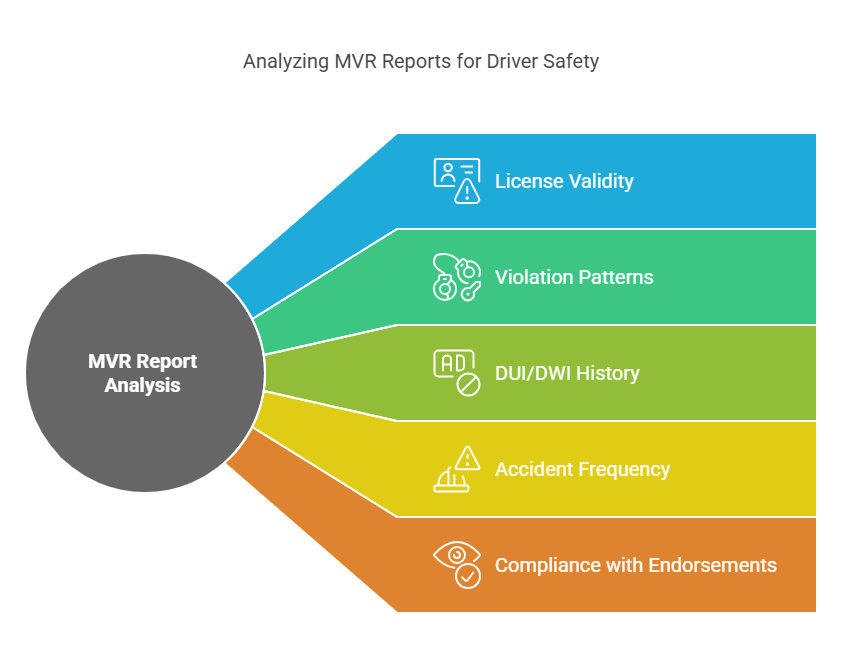
When reviewing MVR reports, employers should focus on:
- License Validity: Ensure the individual holds an active and appropriate license.
- Violation Patterns: Repeated offenses, such as speeding or reckless driving, may indicate a lack of responsibility.
- DUI/DWI History: Alcohol- and drug-related offenses are major red flags for driving positions.
- Accident Frequency: A history of at-fault accidents could point to unsafe driving habits.
- Compliance with Endorsements: Verify that the driver has the necessary endorsements for the role (e.g., hazardous materials, CDL).
Tools and Services for Conducting MVR Checks
Top Tools for MVR Checks
A variety of tools and services are available to help employers conduct efficient and compliant MVR checks. Below is a comparison of some popular options.
| Tool/Service | Features | Benefits | Pricing |
|---|---|---|---|
| Exact Background Checks | Comprehensive MVR reports, nationwide coverage, FCRA compliance, real-time updates | Tailored solutions for employers, seamless integration with HR platforms, excellent customer support | Competitive and transparent |
| Checkr | Easy-to-use platform, customizable background screening | Automated processes and fast results | Flexible pricing tiers |
| HireRight | Global background screening, detailed driving history | Supports MVR checks for domestic and international drivers | Custom quotes |
| GoodHire | User-friendly interface, compliance-focused reports | Simplifies compliance with FCRA and EEOC standards | Moderate to high pricing |
| SambaSafety | Real-time driver monitoring and safety insights | Ideal for fleets with ongoing monitoring needs | Subscription-based |
Why Choose Exact Background Checks?
Exact Background Checks offers employers a reliable, efficient, and compliant solution for conducting MVR checks. Here’s why we stand out:
- Comprehensive Coverage: Access driving records from all 50 states, ensuring no gaps in screening.
- FCRA Compliance: We adhere to all legal regulations, reducing your risk of non-compliance.
- Fast Turnaround: Get accurate results quickly, enabling you to make informed hiring decisions without delays.
- Customizable Solutions: Our services are tailored to meet the unique needs of your business, whether you manage a small team or a large fleet.
- Dedicated Support: Our team of experts provides guidance throughout the process, ensuring seamless integration with your hiring workflow.
By partnering with Exact Background Checks, employers gain peace of mind knowing their screening process is in trusted hands.
Streamlining MVR Checks with Technology
Modern technology has revolutionized the way employers conduct MVR checks, making the process faster, more accurate, and easier to manage. Features such as real-time updates, automated alerts, and cloud-based reporting ensure that businesses remain compliant and up-to-date with driving record changes.
Investing in a reliable screening service like Exact Background Checks allows employers to leverage these technological advancements, ensuring their MVR checks are thorough, efficient, and legally compliant.
Legal Aspects of MVR Checks for Employers
While MVR checks are a critical component of an employer’s hiring and safety protocols, it’s essential to understand and comply with the relevant legal requirements. Failing to adhere to these regulations can expose businesses to significant legal risks. Below, we explore the key legal considerations that employers must keep in mind when conducting MVR checks.
Fair Credit Reporting Act (FCRA) Compliance
The Fair Credit Reporting Act (FCRA) is a key piece of legislation that governs how employers can use background checks, including MVR checks, during the hiring process. The FCRA aims to protect individuals’ privacy and ensure that employers use background checks fairly and transparently. Here are some important FCRA compliance requirements when conducting MVR checks:
- Written Consent: Employers must obtain written consent from the candidate or employee before conducting an MVR check. This ensures that individuals are aware their driving records will be reviewed.
- Adverse Action Procedures: If the results of the MVR check lead to a hiring decision that is unfavorable (e.g., disqualifying an applicant due to a poor driving record), the employer must follow adverse action procedures. This includes providing the candidate with a copy of the report, informing them of the decision, and offering an opportunity to dispute any inaccuracies.
- Notification of Results: If adverse action is taken based on the MVR check, the employer must notify the applicant within a reasonable time frame, including details of the report and the right to challenge the findings.
- Accuracy of Information: Employers must ensure that the MVR reports they use are accurate and up-to-date. If a report contains errors, the employer could be held liable for acting on incorrect information.
State-Specific Laws and Regulations
Each state has its own regulations governing how MVR checks are conducted, as well as what information can be obtained and used during the hiring process. For example:
- California: In California, employers must inform job applicants that they will be conducting an MVR check, and the applicant must provide written consent. The report can only be used for hiring decisions related to driving positions.
- New York: New York employers must follow similar procedures but also must provide candidates with a “Notice of Intent” to request an MVR report. In New York, the use of MVR checks is restricted to positions that involve driving.
- Texas: In Texas, employers must also ensure that candidates have given explicit consent before an MVR check can be requested. Employers in Texas are prohibited from asking for information that isn’t directly relevant to the position.
Employers must understand and comply with these state-specific requirements to avoid violating state laws and to ensure that the MVR check process remains legal and compliant.
Compliance with the Equal Employment Opportunity Commission (EEOC)
The Equal Employment Opportunity Commission (EEOC) enforces laws that prohibit employment discrimination. Employers conducting MVR checks must ensure that their screening practices comply with EEOC guidelines.
- Consistency: Employers must apply MVR checks consistently to all candidates for similar roles. Discriminating against candidates based on protected categories (e.g., race, gender, age) could lead to legal challenges.
- Job Relevance: MVR checks should only be used when directly relevant to the job. For example, a delivery driver position may require an MVR check, while a data entry position may not. The EEOC encourages employers to use background checks, including MVR checks, in a way that doesn’t unfairly disadvantage protected groups.
By adhering to these guidelines, employers can minimize the risk of legal challenges related to discriminatory hiring practices.
Best Practices for Conducting MVR Checks
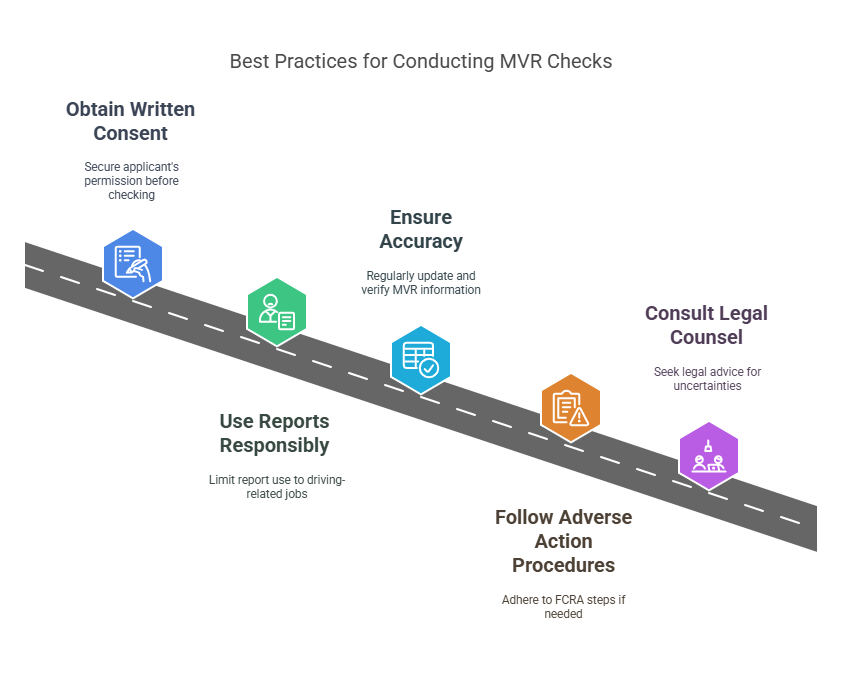
To ensure legal compliance and minimize risk, employers should follow these best practices when conducting MVR checks:
- Obtain Written Consent: Always obtain the applicant’s written consent before conducting any MVR check.
- Use Reports Responsibly: Limit the use of MVR reports to jobs where driving is a primary responsibility.
- Ensure Accuracy: Regularly update and review MVR checks to ensure that the information is accurate and reliable.
- Follow Adverse Action Procedures: If a negative hiring decision is made based on an MVR report, follow the proper steps as outlined in the FCRA.
- Consult Legal Counsel: If unsure about how to handle MVR checks or specific legal concerns, consult with legal professionals specializing in employment law.
Frequently Asked Questions (FAQs)
Here are answers to some common questions employers have about MVR checks:
How long does a violation stay on an MVR?
The duration varies by state and the type of violation. Minor traffic violations typically stay on an MVR for 3–5 years, while more severe offenses like DUIs can remain for up to 10 years or longer.
Can an employer deny a job based on my MVR?
Yes, employers can deny a job if the MVR reveals issues that conflict with the job requirements, such as a suspended license or multiple traffic violations for a driving-related position. However, decisions must comply with the FCRA and other applicable laws.
How often should I check my MVR for errors?
It’s a good idea to review your MVR annually or before applying for jobs or insurance to ensure accuracy. Errors, though rare, can occur and should be corrected promptly.
Do all traffic violations appear on an MVR?
Most violations, including speeding tickets, DUIs, and at-fault accidents, appear on an MVR. However, parking tickets generally do not show up.
Is an MVR the same as a driving record?
Yes, an MVR is often referred to as a driving record. Both terms describe a document that summarizes a person’s driving history.
How long does a violation stay on an MVR?
The duration varies by state and the type of violation. Minor traffic violations typically stay on an MVR for 3–5 years, while more severe offenses like DUIs can remain for up to 10 years or longer.
Can an employer deny a job based on my MVR?
Yes, employers can deny a job if the MVR reveals issues that conflict with the job requirements, such as a suspended license or multiple traffic violations for a driving-related position. However, decisions must comply with the FCRA and other applicable laws.
How often should I check my MVR for errors?
It’s a good idea to review your MVR annually or before applying for jobs or insurance to ensure accuracy. Errors, though rare, can occur and should be corrected promptly.
Do all traffic violations appear on an MVR?
Most violations, including speeding tickets, DUIs, and at-fault accidents, appear on an MVR. However, parking tickets generally do not show up.
Is an MVR the same as a driving record?
Yes, an MVR is often referred to as a driving record. Both terms describe a document that summarizes a person’s driving history.
Conclusion
MVR checks for employers are not only essential for ensuring safety and compliance but also provide substantial benefits in reducing risk, managing costs, and protecting a company’s reputation. Employers who conduct thorough MVR checks demonstrate a commitment to maintaining a safe, reliable workforce, particularly in industries where driving is a core function.
By following best practices, understanding legal requirements, and leveraging trusted services like Exact Background Checks, employers can streamline their MVR screening processes and ensure they are making informed, legally compliant hiring decisions.
The peace of mind that comes with knowing your employees are qualified and responsible drivers is invaluable in today’s competitive business landscape. Start implementing robust MVR checks today to ensure a safer, more compliant future for your business.




Great read! MVR checks are essential for ensuring safety, reducing liability, and maintaining compliance, especially in driving-heavy industries. Regular screenings help build a reliable workforce and protect businesses from risks. Thanks for sharing these insights!